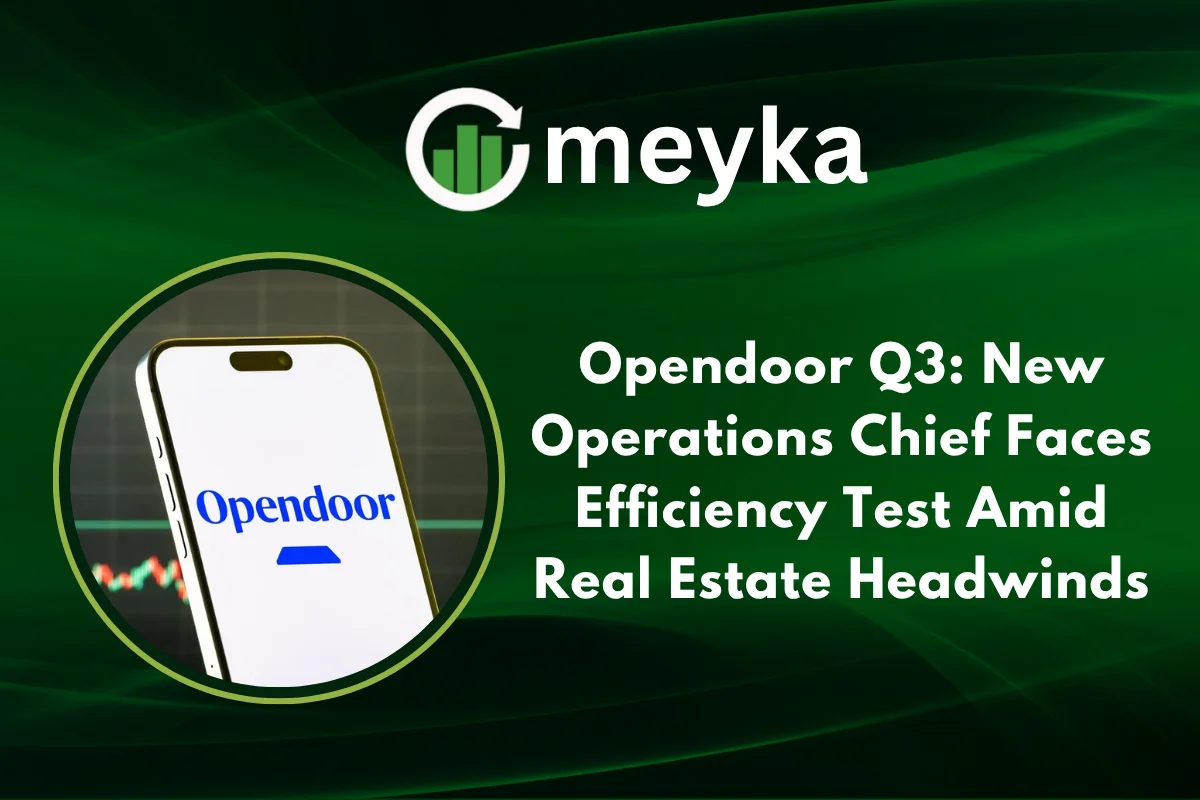Opendoor Q3: New Operations Chief Faces Efficiency Test Amid Real-Estate Headwinds
The real estate and prop-tech sector is under mounting pressure, and for Opendoor (OPEN), the third quarter brings both heightened expectations and meaningful risk. With a fresh leadership addition in the operations slot and macroeconomic headwinds weighing on the housing market, the company’s ability to execute will be tested like never before.
Why this quarter matters
Opendoor’s business model centres on buying homes directly, performing renovations, then reselling them, often called the “iBuying” model. According to the company’s Wikipedia profile, it operates across U.S. markets and seeks to simplify the home-buying and selling process.
But today’s environment is tough: higher mortgage rates, slower transaction volumes, and inventory risk are all in play. At the same time, Opendoor has brought in new operations leadership with a mandate to improve efficiency and reset the firm’s cost structure.
New Operations Lead: Efficiency in Focus
The company recently announced the hiring of Giang LeGrice, formerly of Shopify Inc., to head operations for Opendoor. This appointment signals a shift: from simply scaling asset-heavy holdings to tightening operational workflows, reducing cost per transaction, and improving unit economics.
Alongside LeGrice, the hire of Kaz Nejatian as CEO in September 2025, also an ex-Shopify executive, underscores the technology-oriented pivot.
In his remarks, Nejatian highlighted the use of AI and data-driven operations to reshape how Opendoor buys and sells homes.
What this means
- A tangible push to streamline processes: fewer manual steps in home acquisition, renovation, and resale cycles.
- A move toward leveraging technology (AI, pricing algorithms, platform-based models) rather than purely asset flips.
- An expectation from investors that Opendoor can convert a lofty vision into measurable operational improvement.
However, the leadership changes do not guarantee results, especially given the macro conditions facing the company.
Navigating Real-Estate Headwinds
Market conditions
The broader housing market continues to battle high interest rates, tighter lending standards, and lower buyer demand. These factors compress margins and make holding inventory riskier. According to the analysis, Opendoor’s Q3 guidance projects revenue decline and renewed losses.
Operational challenges
- Inventory turnover remains sluggish: many homes are held longer, raising carrying costs and reducing margin.
- Capital intensity: real-estate acquisitions tie up large amounts of capital and amplify exposure to market dips and rate changes.
- Cost structure: the business needs to reduce transaction costs, renovation overhead, and logistical friction, exactly where the new operations chief is needed.
Investor sentiment & stock implications
The stock of Opendoor has oscillated heavily, driven by both fundamentals and hype. Some commentators warn of meme-stock dynamics overshadowing underlying business issues. As part of stock research, it’s vital to distinguish between optimism from leadership changes and durable results in revenue, margin, and cash flow.
What to Watch in Q3
As Opendoor prepares to report its Q3 results, here are the key indicators we suggest monitoring:
- Revenue and home-purchase volumes – Any decline or stagnation will raise red flags about demand and execution.
- Adjusted EBITDA / margin trends – Since profitability has been elusive, improved margins would validate the operational pivot.
- Inventory-turn metrics – Days-on-market and percentage of aged inventory will show how efficiently homes are moving.
- Cost per transaction / G&A – With a new operations chief, cost discipline must show up in the numbers.
- Capital structure and leverage – Given the business’s capital intensity and debt load, management of the balance sheet is critical.
- Technology/platform metrics – Progress in AI tools, partner agent modules, or other scalable platforms will hint at the long-term direction beyond iBuying.
Broader Implications for the Stock Market & Tech Axis
Though Opendoor is not a pure AI stock, its pivot to technology and use of data-driven operations link it to broader themes in the stock market. For investors doing stock research, here’s how Opendoor fits:
- It sits at the intersection of real-estate disruption and platform/tech transformation, making it a hybrid play.
- The magnitude of operational improvement required gives it activist/turnaround appeal, which often draws momentum-driven flows.
- Investors who favour thematic exposure (tech in real estate) may view Opendoor as a manifestation of the broader digital disruption in housing.
However, caution remains warranted: disruption narratives do not always translate into profits, especially when underlying markets (housing) are under pressure.
Final Thoughts
Opendoor stands at a critical operating juncture. With a new operations chief in place and high ambitions for technology-led transformation, the company is attempting to re-engineer its business. At the same time, the housing market remains challenging, and the model is risky.
For investors and analysts doing stock research, the story is compelling, but only if Opendoor can deliver improved execution, tighter cost control, and reliable flow through to the bottom line. If Q3 shows meaningful progress, the stock may justify the optimism. If it disappoints, the weight of expectations and structural risk could weigh heavily.
In short, it’s a high-risk, high-potential scenario. Keep a close eye on the operational metrics. The new operations chief faces a steep test, and the market will judge both the strategy and execution.
FAQs
The company recently appointed Giang LeGrice, formerly a vice-president of operations at Shopify, to lead operations at Opendoor.
Opendoor’s strategy includes shifting toward an “AI-first and agent-led” model, reducing reliance on high-capital home acquisitions, and enhancing technology and data platforms to streamline operations.
Key metrics include transaction volume, margin/adjusted EBITDA, inventory-turnover rates, cost per transaction, and progress in technology platform initiatives. These indicators will show whether the operational pivot is gaining traction.
Disclaimer:
The content shared by Meyka AI PTY LTD is solely for research and informational purposes. Meyka is not a financial advisory service, and the information provided should not be considered investment or trading advice.






